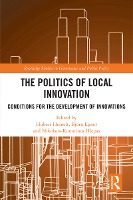Some cities manage to mobilize innovation potentials and respond to challenges, such as demographic change and immigration as well as economic restructuring, while others do not. This book solves this problem by answering the following question: What are the conditions for the development of local innovation?
In order to identify these conditions, the book explores case study cities which are perceived as success cases of local innovation by the respective local community, and sometimes also nationally or internationally. The conditions for local innovations are not sought primarily in economic, social, or institutional circumstances. Instead, this book focuses on the communicative interactions by which local actors develop locally embedded knowledge or a specific social imaginary about those circumstances, as well as the constraints and opportunities deriving from them. The authors focus on a comparative case study of ten cities - Bensheim, Frankfurt, Kassel, Leipzig, and Offenbach in Germany, and Athens, Chania, Elefsina, Kalamata, and Thessaloniki in Greece. The book is based on content analysis of policy documents and local newspapers as well as in-depth interviews with key local actors.
This book will be of interest to scholars and students of political science and policy analysis, as well as sociology, geography, urban studies, and planning. It will also interest local politicians and bureaucrats concerned with achieving innovation in cities.

